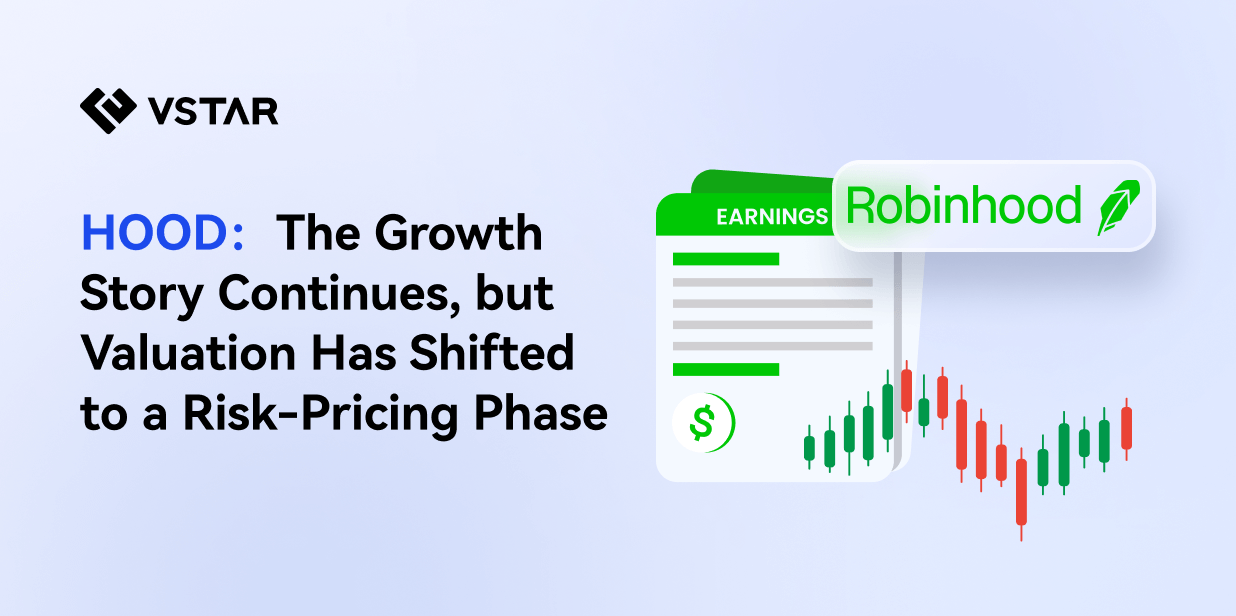In the wake of a global pandemic, the healthcare industry has taken center stage, capturing the attention of investors seeking profitable opportunities. Among the market leaders in healthcare is Johnson & Johnson (NYSE: JNJ), a renowned company with a rich history in the field.
So, should you buy JNJ stock? Let's find out together.
Latest News Of Johnson & Johnson Investors and Traders Should Note
As a prominent medical giant, Johnson & Johnson has established a reputation for its groundbreaking innovations and contributions to enhancing the quality of human life. If you are considering trading JNJ stock, there are several noteworthy updates that you should be aware of. This news will provide you with valuable insights to inform your trading decisions. They include the following:
Johnson & Johnson has recently announced several groundbreaking results from their clinical trials.
● In the Phase 2b FRONTIER 1 trial, their novel oral interleukin-23 receptor antagonist peptide, JNJ-2113, demonstrated positive outcomes in adult patients with moderate-to-severe plaque psoriasis. The trial successfully achieved all primary and secondary efficacy endpoints, highlighting the potential of JNJ-2113 as a promising treatment option.
● Furthermore, the proof-of-concept Phase 2 UNITY trial showed promising results in treating pregnant individuals at high risk of early-onset severe hemolytic disease of the fetus and newborn. Using nipocalimab led to a statistically significant increase in the proportion of participants achieving a live birth without intrauterine transfusions, surpassing the historic reference point.
● In another significant development, the interim analysis of Cohort 1 of the Phase 3 THOR study demonstrated the efficacy of BALVERSA® (erdafitinib) compared to chemotherapy in patients with metastatic or unresectable urothelial carcinoma. The study achieved its primary endpoint of overall survival, showcasing a 36% reduction in the risk of death.
All of the above point to the fact that Johnson and Johnson is currently enjoying tremendous success in drug innovation and testing. This is expected to, in return, impact positively on JNJ stock prices. Thus making JNJ an excellent buy for traders and investors currently.
Johnson & Johnson's Overview

Credit: iStock
Johnson & Johnson was founded in 1886 by Robert Wood Johnson, James Wood Johnson, and Edward Mead Johnson. Johnson & Johnson is headquartered in New Brunswick, New Jersey, United States.
Currently, Joaquin Duato serves as the Chairman of the Board and Chief Executive Officer (CEO) of Johnson & Johnson. He has played a pivotal role in driving the company's success. As Vice Chairman of the Executive Committee, he provided strategic guidance to the Pharmaceuticals and Consumer Health sectors. He has also previously served as the Worldwide Chairman of Pharmaceuticals.
Company Structure and Segments
Johnson & Johnson operates through various segments, including Pharmaceutical, Consumer Health, and Medical Devices. These segments offer a wide range of products and services to cater to the needs of healthcare professionals and consumers.
Key Milestones
Johnson & Johnson has achieved numerous milestones throughout its history. Some notable milestones include the following:
● JNJ was founded in 1886 by a group of eight women and six men
● Johnson & Johnson in 1887 and introducing the world's first maternity kit in 1894
● 2017: Acquisition of Interventional Spine, Inc. and Neuravi.
● 2021: Generated $100 million in Covid-19 vaccine sales during the first quarter of 2021.
Johnson & Johnson's Business Model and Products/Services

Credit: iStock
Johnson & Johnson generates revenue through its diversified business model. The company earns money by manufacturing and selling a wide range of healthcare products and services globally.
Main Products/Services
As stated earlier, Johnson & Johnson's main products and services encompass pharmaceuticals, consumer health products, and medical devices. These include prescription drugs, over-the-counter medications, skincare and personal care items, baby care products, surgical instruments, orthopedic implants, and diagnostic equipment.
Some of the major products they offer include:
Listerine: Listerine is a well-known antiseptic mouthwash used to kill bacteria and fight bad breath, promoting oral hygiene and a fresh mouth sensation.
Johnsons’s Baby Powder: Johnson's Baby Powder is a talcum powder product used for generations to help keep skin dry and soft. It is commonly used on babies to prevent diaper rash and also by adults for various personal care purposes.

Credit: iStock
Benadryl: Benadryl is an over-the-counter antihistamine medication manufactured by Johnson & Johnson. It is commonly used to relieve symptoms of allergies, such as sneezing, itching, and watery eyes, and can also provide relief for common cold symptoms and insect bites.
Tylenol: Tylenol, also known as acetaminophen, is a popular pain reliever and fever reducer. It is widely used to alleviate various types of pain, including headaches, muscle aches, and toothaches, and to reduce fever associated with common illnesses.
Johnson & Johnson's Financials, Growth, and Valuation Metrics

Credit: Unsplash
Johnson and Johnson has a market capitalization of 421.28 billion USD. Johnson & Johnson's financial performance for the quarter ending March 31, 2023, experienced a decline in net income by 101.32% year-over-year. However, the twelve-month net income also declined by 35.83% year-over-year.
On the positive side, the company's revenue showed a 5.63% increase for the quarter and a 1.46% increase for the twelve months ending March 31, 2023. Over the past five years, Johnson & Johnson has witnessed steady revenue growth, increasing from $81,581 million to $94,943 million. The net profit margin as of March 31, 2023, stands at 13.22%.
Key Financial Ratios and Metrics
Johnson & Johnson's current Forward PE Ratio is 15.24. Main competitors like AbbVie Inc (ABBV) and Pfizer Inc (PFE) have forward PE ratios of 12.58 and 10.76, respectively. JNJ stock, currently trading at $162.81, is below its estimated fair value of $207.03 by more than 20%. This suggests that JNJ stock is undervalued, and there is potential for the stock to increase in value. This, in turn, presents an opportunity for investors.
JNJ Stock Performance

Credit: iStock
Now it’s time to look at JNJ's stock performance. However, before we do this, let’s quickly explore the JNJ stock trading information you need to know.
JNJ Stock Trading Information
JNJ stock was first listed on the New York Stock Exchange (NYSE) on September 17, 1944, under the ticker symbol "JNJ.” Being a U.S.-based company, the primary trading happens in the United States, and JNJ stock transactions are conducted in U.S. dollars (USD).
Regular trading hours for JNJ stock on the NYSE are from 9:30 a.m. to 4:00 p.m. Eastern Time (ET), Monday through Friday, excluding holidays. Pre-market trading of JNJ stock typically occurs between 4:00 a.m. and 9:30 a.m. ET, while after-market hours are usually from 4:00 p.m. to 8:00 p.m. ET. However, these hours can vary slightly depending on the brokerage service.
Stock Splits: Johnson & Johnson stock has undergone a total of 6 stock splits. The latest instance of the JNJ stock division happened on the 13th of June, 2001.
Dividends: Owning JNJ stock currently yields a dividend of $1.19 per share
Overview of JNJ Stock Performance
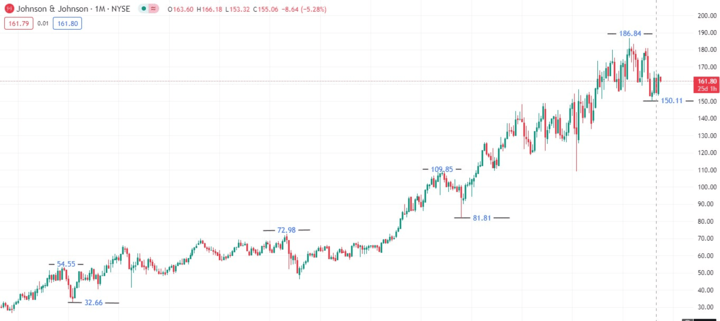
Credit: TradingView
Since its listing on the NYSE, JNJ stock has performed remarkably well. JNJ stock rapidly rose in value to reach the 54.55 level before briefly falling to the 32.66 level. Then JNJ stock went on a significant bull run that saw it create and smash a new all-time high (72.98) to reach a new high of 109.85 before briefly dipping to the 81.81 level.
After this, JNJ stock price increased in value massively again, and this particular run resulted in the creation of the current all-time high of 186.84. After that, however, JNJ's stock price fell to the 150.11 level. Currently, JNJ stock price sits around the 161.92 level, but there's no doubt about the fact that this stock is perfectly poised for another bull run that will most likely result in the smashing of old highs and the setting of new ones.
Key Drivers of JNJ Stock Price
Johnson & Johnson (JNJ) is a large, complex company, and its stock price can be influenced by a wide array of factors. Some of the key drivers that can impact JNJ's stock price include the following:
Financial Performance: As with any company, JNJ's quarterly and annual financial results are significant drivers of its stock price. Strong revenues, profits, or growth can increase the stock price, while disappointing results can lead to a decline. For example, the success of JNJ's single-dose COVID-19 vaccine significantly boosted its financial performance in 2021 and 2022.
Drug Pipeline: New drug approvals and the potential of JNJ's drug pipeline can impact the stock price. Positive clinical trial results or FDA approval for a new drug can send the stock price soaring. On the flip side, a failed clinical trial or rejection by regulatory authorities can negatively affect the stock price.
Mergers and Acquisitions (M&A): JNJ's strategy often includes acquiring smaller companies with promising products. Announcements of such M&A activity can increase the stock price if investors believe the acquisition will increase future profits.
Future Prospects of JNJ Stock
A 12-month price forecast for JNJ stock by 19 analysts states that JNJ stock’s median target is set at $177.00, with the highest estimate at $215.00 and the lowest at $161.00. The median prediction suggests an increase of 8.72% from the current trading price of $162.80.
Risks/Challenges and Opportunities
Johnson & Johnson (JNJ) is a major player in the healthcare sector. However, you should know that JN stock faces significant competitive risks, among other challenges.
JNJ Stock Competitive Risks
JNJ operates in a competitive landscape with numerous formidable players, such as Pfizer (PFE), Tilray (TLRY), Canopy Growth Corporation (CGC), Merck (MRK), Aurora Cannabis (ACB), Bristol-Myers Squibb (BMY), and AstraZeneca (AZN), among others. Developments and news from these companies can affect JNJ's stock price and valuation. For example, let’s look at Pfizer and Aurora Cannabis.
Pfizer is a global pharmaceutical giant that competes directly with JNJ in many areas. For instance, both companies are heavily invested in vaccine development. Pfizer's success with its COVID-19 vaccine, developed with BioNTech, poses significant competition to JNJ's single-dose vaccine. This could, in turn, affect JNJ's stock valuation.
ACB presents a different type of threat. As a leader in the cannabis industry, ACB could disrupt JNJ's pain management drug segment if medical cannabis use becomes more widespread and accepted. This will, of course, have significant impacts on JNJ's stock price.
That said, JNJ stock does retain some distinct competitive advantages. The company's diversified business structure, spanning pharmaceuticals, medical devices, and consumer health products, provides a certain level of insulation against risks in any single segment. It also has a robust pipeline of drugs and a strong record of innovation.
Other Risks
Aside from competition, JNJ stock faces other risks. Some of these include regulatory changes, legal challenges, and product liability issues. The opioid crisis and associated lawsuits in the U.S., for example, have created significant financial and reputational risks.
Growth Opportunities

Credit: iStock
Despite the risks, JNJ has significant growth opportunities. The company's strong research and development capabilities could lead to breakthroughs in various medical fields. Its robust pipeline of pharmaceutical products and continued investment in gene and cell therapies present potential growth areas.
Future Outlook and Expansion
JNJ continues to look for opportunities to expand its portfolio through strategic acquisitions and partnerships. It aims to lead in areas of high unmet medical need, like Alzheimer's disease and cancer. Given the ever-growing global healthcare market and the company's commitment to innovation and strategic growth, JNJ's future outlook seems positive, albeit not without challenges.
Why Traders Should Consider JNJ Stock

Credit: iStock
From all that has been said so far, it’s pretty obvious that JNJ stock is perfectly primed for a bullish movement. Are you currently thinking, “Should I buy JNJ stock?” If you are, then read on to discover some reasons why you should consider trading JNJ stock:
Diversified Revenue Streams: JNJ operates across three diverse segments. This diversity helps balance the business and provides a hedge against significant downturns in any one area. So the chances of failing to profit from JNJ stock are pretty low.
Consistent Dividend Payments: JNJ has a long history of paying and regularly increasing its dividends. This can provide traders with a constant income stream alongside potential capital appreciation.
Robust Financial Performance: Despite various market conditions, JNJ has demonstrated a capacity for delivering robust financial performance, including a strong balance sheet and consistent revenue growth.
Profit Strategies for JNJ Stock
Looking to trade JNJ stock? Here are some trading strategies that can help you stay profitable in the short and long term:
Pennant: This is a continuation pattern characterized by a large move in a stock followed by a consolidation period, which forms the shape of a pennant. The breakout direction from the pennant often signals the direction of the next price move.
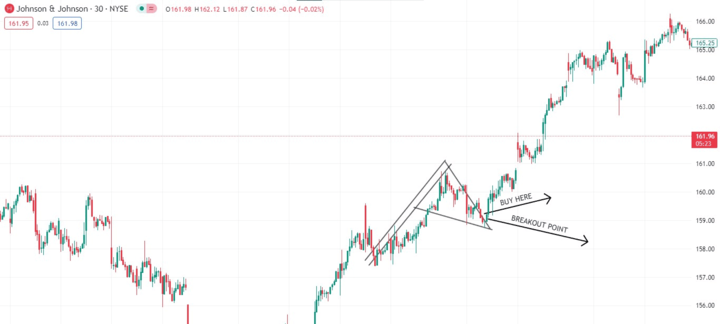
Credit: TradingView
Relative Strength Index (RSI): This momentum oscillator measures the speed and change of price movements. Values of 70 or above suggest that JNJ might be overbought (indicating a possible price pullback). In contrast, values of 30 or below imply that it might be oversold (signifying a potential price increase). You can use this tool to predict when to buy or sell JNJ shares for maximum profitability.
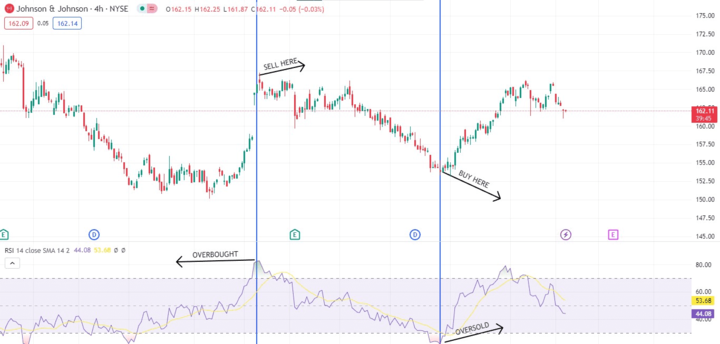
Credit: TradingView
Moving Average Convergence Divergence (MACD): This trend-following momentum indicator shows the relationship between two moving averages of JNJ's price. When the MACD line crosses above the signal line, it's a bullish signal and may be an excellent time to buy. Conversely, a cross below the signal line suggests a bearish signal and might be a suitable time to sell.
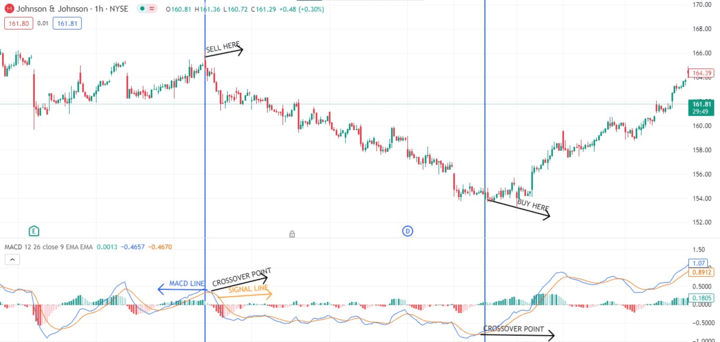
Credit: TradingView
There are several JNJ stock trading options available; however, they all come with several risks. That said, you should know that trading CFDs is the recommended approach to trading JNJ stock. Why CFDs? Find out below!
Advantages of CFD
Leverage: CFDs allow traders to leverage their investment, which means you can trade larger positions than your initial deposit.
Short Selling: CFDs allow traders to take a short position and profit from falling market prices, not just rising ones.
No Expiration: Unlike some derivative products, most CFDs do not have a specified future date, so the trade can be closed whenever you decide.
Global Market Access: Through CFD trading, investors can access a wide range of markets globally, including indices, commodities, currencies, and shares, all from a single platform.
No Stamp Duty: CFDs are derivative products, and traders do not own the underlying asset. So you won’t have to pay any stamp duty.
Trade JNJ Stock CFD at VSTAR
Ready to start trading JNJ stock CFDs? If you are, there’s just one last thing you’ll need, a CFD provider. Don’t know any? Not to worry, we have an excellent CFD trading platform recommendation for you, VSTAR! VSTAR is an institutional-level trading platform that offers several unique and amazing benefits. Some of these include the following:
Fully Regulated: VSTAR, as a fully regulated broker, offers an added layer of security. It adheres to stringent regulatory standards, which provide traders with assurance regarding the safety of their investments.
Super Low Trading Cost: Trading JNJ stock CFDs with VSTAR comes with lower trading costs. This can enhance potential profitability by reducing the transaction costs involved in trading.
Lightning Fast Execution: STAR's platform provides lightning-fast execution of trades. This can be crucial in CFD trading, where speed and price accuracy are vital due to the fast-paced nature of the markets.
Risk-Free Demo for Practice: VSTAR offers a demo account that’s perfect for allowing traders to practice trading JNJ stock CFDs in a risk-free environment. This can be especially useful for beginners to familiarize themselves with the platform and CFD trading strategies.


Conclusion
The financial outlook of JNJ stock appears optimistic, with current events and updates presenting this healthcare behemoth as a potentially rewarding investment for traders. Johnson & Johnson has consistently seen a rise in its stock value, with the upward trend showing no signs of slowing down.
So download VSTAR today and get started with trading JNJ stock CFDs.









